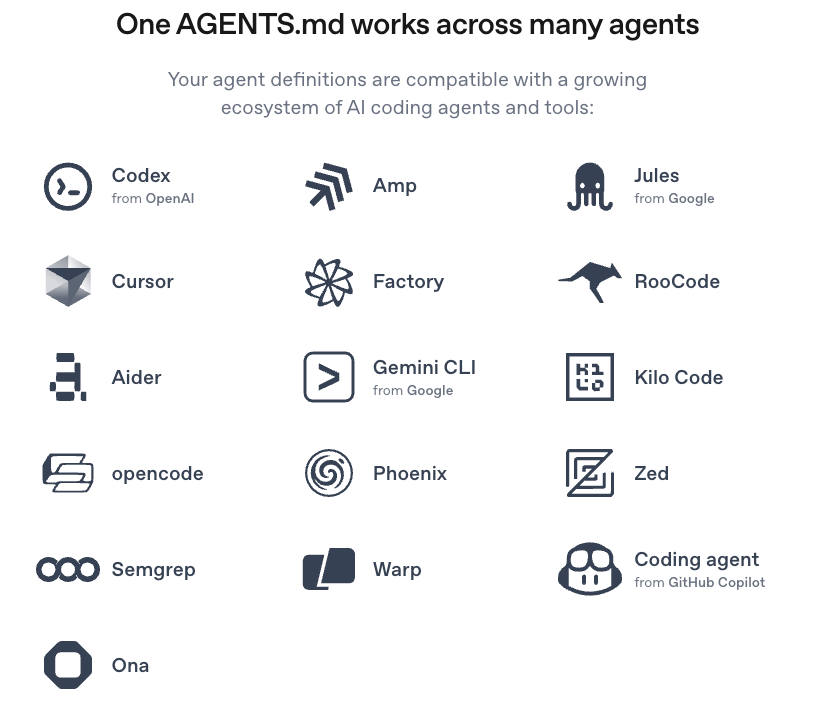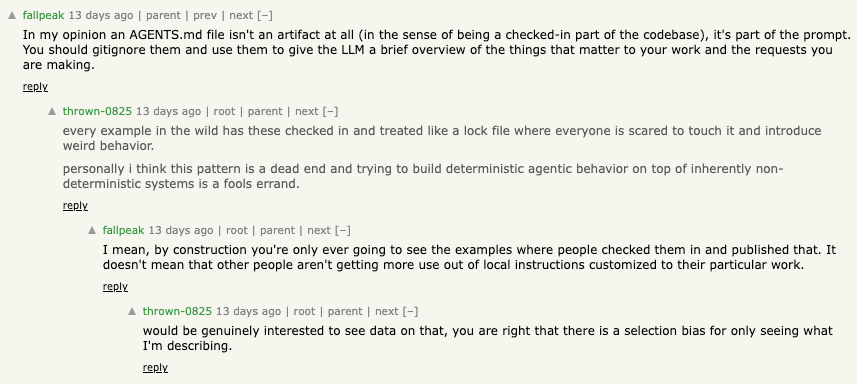
Security News
New CNAPulse Dashboard Tracks CNA Activity and Disclosure Trends
Open source dashboard CNAPulse tracks CVE Numbering Authorities’ publishing activity, highlighting trends and transparency across the CVE ecosystem.


Sarah Gooding
September 3, 2025
More than 60% of developers now actively use AI coding assistants, and over 80% of companies have adopted agentic AI for coding tasks this year. But as usage has surged, each tool seemed to invent its own conventions: Anthropic’s Claude looked for CLAUDE.md, Google Gemini had GEMINI.md, and GitHub Copilot expected .github/copilot-instructions.md. Some developers tried to keep up by maintaining multiple files, others crammed machine instructions into their README.md, while many gave up entirely and let agents guess. The result was fragmented, inconsistent, and often frustrating.
A new open format called AGENTS.md is emerging as the solution. Billed as a “README for machines,” the format gives AI agents a structured place to learn about a project: setup steps, coding style, testing workflows, and repository context. Instead of juggling half a dozen agent-specific files, developers can write one set of instructions and know that multiple agents will parse it.
The idea for AGENTS.md first surfaced in May 2025, when developers began voicing frustration about this fragmentation.
By mid-June, conversations had shifted into collaborative efforts to define a single standard format. Momentum built quickly, and by July AGENTS.md had gained traction as the neutral default, with tools like Codex, OpenCode, Gemini CLI, Jules, and Factory AI beginning to add support.
According to the project’s website, AGENTS.md is already used in more than 20,000 open source repositories.
The project positions AGENTS.md as a complement to human-facing documentation. README.md files are meant for quick starts, project descriptions, and contribution guidelines, while AGENTS.md provides the detailed context coding agents need: build steps, test workflows, and code conventions. Keeping the two separate gives agents a predictable place to look without cluttering READMEs.
The site also showcases sample content, such as setup commands, code style conventions, and testing or PR instructions. A typical file might look like this:
# AGENTS.md
## Setup commands
- Install deps: `pnpm install`
- Start dev server: `pnpm dev`
- Run tests: `pnpm test`
## Code style
- TypeScript strict mode
- Single quotes, no semicolons
- Use functional patterns where possibleFor large projects, nested AGENTS.md files allow tailored guidance per package. OpenAI’s own repository has embraced the practice, with nearly 90 AGENTS.md files spread across its subprojects.
What makes AGENTS.md different from earlier attempts is the scope of its backing. The project is a community-driven effort shaped by OpenAI, Sourcegraph, Google, Cursor, and Factory. These companies compete in the AI tooling space, but aligning around a single format reduces duplication and helps the ecosystem grow more predictably.
The adoption list continues to grow. RooCode, Aider, Gemini CLI, Kilo Code, opencode, Phoenix, Zed, Semgrep, and Warp are among the tools that now support AGENTS.md. Each can read the same file and adjust their behavior accordingly.
Last week, GitHub announced that Copilot also supports AGENTS.md. Developers can add an AGENTS.md file at the root of a repository or inside subdirectories, and Copilot will use it to guide the agent’s actions. GitHub still supports older formats, but the inclusion of AGENTS.md signals that the standard is becoming the preferred approach.

On Hacker News, some developers applauded the move toward a standard format while others contend the instructions belong in a well-written README instead. Some debated whether AGENTS.md should even exist as a checked-in artifact, arguing that agent-specific guidance doesn’t belong in repositories at all, since most of it could be expressed as linting rules, CONTRIBUTING.md, or documentation meant for humans. Others felt a minimal set of instructions tailored to agents is reasonable, since AI often struggles with conventions that humans take for granted.
There was also disagreement on whether AGENTS.md should live in version control. One camp suggested it should be treated more like ephemeral prompt context and ignored by git, while others noted that in practice most public examples are checked in and treated almost like lock files. The exchange reflected the uncertainty around whether AGENTS.md should be a permanent artifact or just runtime context for AI tools.

Early community commentary has been mostly positive. Developers point to the simplicity of the approach and compare it to the adoption of lock files in package managers. It's not glamorous, but becomes foundational once it's more widely adopted. Others note that unifying instructions across agents could make onboarding new contributors easier, since the same setup and workflow details will be consistently enforced by AI tools.
The rise of AGENTS.md reflects a shift in how developers are working with AI. What started as experimental sidekicks are now becoming indispensable tools, and that makes standards more important.
For developers, the immediate benefit is less duplication and more consistent results across agents. For the ecosystem, AGENTS.md represents a rare moment of alignment between competing vendors. And for security and tooling teams, the format opens up new possibilities: a predictable format for auditing instructions, enforcing policies, and understanding how AI systems interact with code.
AGENTS.md is still new, but momentum is building quickly. With industry heavyweights backing it, GitHub Copilot integration, and adoption already reported in tens of thousands of projects, the standard is well on its way to becoming the de facto standard for AI coding agents.
Subscribe to our newsletter
Get notified when we publish new security blog posts!
Try it now

Security News
Open source dashboard CNAPulse tracks CVE Numbering Authorities’ publishing activity, highlighting trends and transparency across the CVE ecosystem.

Research
/Security News
The Socket Threat Research Team uncovered a coordinated campaign that floods the Chrome Web Store with 131 rebranded clones of a WhatsApp Web automation extension to spam Brazilian users.

Security News
ENISA’s 2025 Threat Landscape report highlights how AI is reshaping cyber attacks, driving phishing, model poisoning, and software supply chain risks.